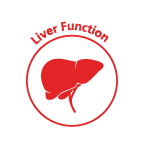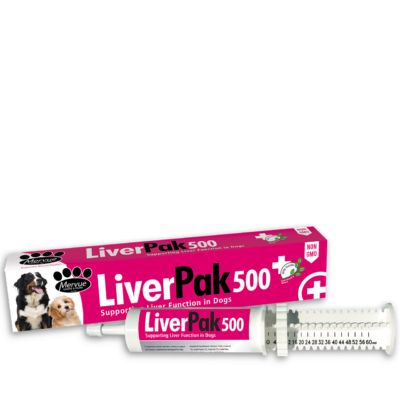- +353 21 422 0397
- info@mervue.ie
- Mon - Fri: 09:00 - 17:00
 The liver is the largest and one of the most complex organs in the dog and has many vital functions. It is involved in carbohydrate, fat and protein metabolism. The production of protein and storage of glycogen, triglycerides, bile and the metabolism and storage of some vitamins and minerals also occurs in the liver. In addition, the liver is responsible for the metabolism and clearance of drugs, chemicals and the by-products of metabolism. The liver also synthesis many important proteins, such as those involved in blood clotting.
The liver is the largest and one of the most complex organs in the dog and has many vital functions. It is involved in carbohydrate, fat and protein metabolism. The production of protein and storage of glycogen, triglycerides, bile and the metabolism and storage of some vitamins and minerals also occurs in the liver. In addition, the liver is responsible for the metabolism and clearance of drugs, chemicals and the by-products of metabolism. The liver also synthesis many important proteins, such as those involved in blood clotting.
The liver has huge reserves and a great capacity for regeneration if liver cells are damaged or die, therefore by the time signs of liver disease occur, there may be very little functional liver remaining.
 Because the liver performs so many functions there are several causes of liver disease including drugs, toxins, cancer, metabolic diseases and infections. Many older dogs which have advanced arthritis live good quality lives because of the pain relief that they experience from non-steroidal anti-inflammatory drugs (NSAIDs) prescribed by their veterinary surgeons. All NSAIDs are metabolised by the liver and the potential for liver toxicity though not common, should not be ignored. Signs of liver toxicity are often observed during the initial three weeks of treatment with an NSAID but can be observed at any time. NSAIDs are often administered daily in dogs for extended periods of time and in many cases years. Many vets recommend the dose be reduced to the minimum effective dose and treatment supplemented with alternative therapies such as nutraceuticals, physiotherapy and restricted exercise. The likelihood of NSAID toxicity of any sort (including intestinal, kidney, blood or liver) is increased in dogs with impaired liver function (e.g. older dogs) and it is also recommended that other drugs that are also metabolised by the liver are not administered at the same time as NSAIDs. Potential liver toxicity during NSAID administration can be monitored with regular blood testing.
Because the liver performs so many functions there are several causes of liver disease including drugs, toxins, cancer, metabolic diseases and infections. Many older dogs which have advanced arthritis live good quality lives because of the pain relief that they experience from non-steroidal anti-inflammatory drugs (NSAIDs) prescribed by their veterinary surgeons. All NSAIDs are metabolised by the liver and the potential for liver toxicity though not common, should not be ignored. Signs of liver toxicity are often observed during the initial three weeks of treatment with an NSAID but can be observed at any time. NSAIDs are often administered daily in dogs for extended periods of time and in many cases years. Many vets recommend the dose be reduced to the minimum effective dose and treatment supplemented with alternative therapies such as nutraceuticals, physiotherapy and restricted exercise. The likelihood of NSAID toxicity of any sort (including intestinal, kidney, blood or liver) is increased in dogs with impaired liver function (e.g. older dogs) and it is also recommended that other drugs that are also metabolised by the liver are not administered at the same time as NSAIDs. Potential liver toxicity during NSAID administration can be monitored with regular blood testing.
The signs of liver disease are often very subtle initially and may only be detected by your vet on clinical examination or following blood test. The importance of an annual health check with your vet cannot be overemphasised because it enables conditions such as liver disease to be detected early. Signs that a dog may have a problem with its’ liver which should alert the owner include:
The treatment of liver disease depended on the underlying cause if it can be identified. Nutritional strategies such as the use of LIVERPAK for Dogs which help to reduce the burden on the liver may also be beneficial.
 LIVERPAK for Dogs contains SAMe and silymarin (derived from the milk thistle plant) which have been demonstrated to have liver protecting properties (so called “hepatoprotectants”). LIVERPAK for Dogs also contains artichoke which has been used for many years in herbal medicine. Extracts from artichoke have been used to protect the liver by increasing bile output and as a diuretic and lipid-lowering agent. LIVERPAK for Dogs also contains carnitine which helps to clear fat from the liver. By supplementing carnitine it spares the dog having to use its’ own skeletal muscle as a source of carnitine and thus reduces muscle wastage. LIVERPAK for Dogs also contains vitamins E and C which have very strong antioxidant effects and help to protect liver cells from the effects of disease and inflammation.
LIVERPAK for Dogs contains SAMe and silymarin (derived from the milk thistle plant) which have been demonstrated to have liver protecting properties (so called “hepatoprotectants”). LIVERPAK for Dogs also contains artichoke which has been used for many years in herbal medicine. Extracts from artichoke have been used to protect the liver by increasing bile output and as a diuretic and lipid-lowering agent. LIVERPAK for Dogs also contains carnitine which helps to clear fat from the liver. By supplementing carnitine it spares the dog having to use its’ own skeletal muscle as a source of carnitine and thus reduces muscle wastage. LIVERPAK for Dogs also contains vitamins E and C which have very strong antioxidant effects and help to protect liver cells from the effects of disease and inflammation.
LIVERPAK for Dogs is formulated as a paste should be administered under the direction of a veterinary surgeon.